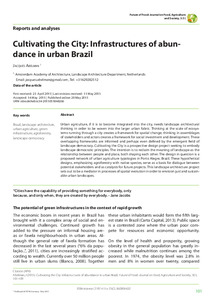View/
Date
2015-05-20Author
Abelman, JacquesSubject
630 AgricultureMetadata
Show full item record
Aufsatz

Cultivating the City: Infrastructures of abundance in urban Brazil
Abstract
Urban agriculture, if it is to become integrated into the city, needs landscape architectural thinking in order to be woven into the larger urban fabric. Thinking at the scale of ecosystems running through a city creates a framework for spatial change; thinking in assemblages of stakeholders and actors creates a framework for social investment and development. These overlapping frameworks are informed and perhaps even defined by the emergent field of landscape democracy. Cultivating the City is a prospective design project seeking to embody
landscape democratic principles. The intention is to reclaim the meaning of landscape as the relationship between people and place, both shaping each other. The design in question is a proposed network of urban agriculture typologies in Porto Alegre, Brazil. These hypothetical designs, emphasizing agroforestry with native species, serve as a basis for dialogue between potential stakeholders and as catalysts for future projects. This landscape architecture project sets out to be a mediator in processes of spatial evolution in order to envision just and sustainable urban landscapes.
landscape democratic principles. The intention is to reclaim the meaning of landscape as the relationship between people and place, both shaping each other. The design in question is a proposed network of urban agriculture typologies in Porto Alegre, Brazil. These hypothetical designs, emphasizing agroforestry with native species, serve as a basis for dialogue between potential stakeholders and as catalysts for future projects. This landscape architecture project sets out to be a mediator in processes of spatial evolution in order to envision just and sustainable urban landscapes.
Citation
In: Future of Food: Journal on Food, Agriculture and Society. Witzenhausen : University of Kassel, Department of Organic Food Quality and Food Culture. - Vol. 3, No. 1 (2015), S. 101-109Citation
@article{urn:nbn:de:hebis:34-2015051848266,
author={Abelman, Jacques},
title={Cultivating the City: Infrastructures of abundance in urban Brazil},
year={2015}
}
0500 Oax 0501 Text $btxt$2rdacontent 0502 Computermedien $bc$2rdacarrier 1100 2015$n2015 1500 1/eng 2050 ##0##urn:nbn:de:hebis:34-2015051848266 3000 Abelman, Jacques 4000 Cultivating the City: Infrastructures of abundance in urban Brazil / Abelman, Jacques 4030 4060 Online-Ressource 4085 ##0##=u http://nbn-resolving.de/urn:nbn:de:hebis:34-2015051848266=x R 4204 \$dAufsatz 4170 7136 ##0##urn:nbn:de:hebis:34-2015051848266
<resource xsi:schemaLocation="http://datacite.org/schema/kernel-2.2 http://schema.datacite.org/meta/kernel-2.2/metadata.xsd"> 2015-05-27T08:53:58Z 2015-05-27T08:53:58Z 2015-05-20 2197-411X urn:nbn:de:hebis:34-2015051848266 http://hdl.handle.net/123456789/2015051848266 eng Department of Organic Food Quality and Food Culture at the University of Kassel, Germany and Federation of German Scientists (VDW) Urheberrechtlich geschützt https://rightsstatements.org/page/InC/1.0/ Brazil landscape architecture urban agriculture green infrastructure agroforestry landscape democracy 630 Cultivating the City: Infrastructures of abundance in urban Brazil Aufsatz Urban agriculture, if it is to become integrated into the city, needs landscape architectural thinking in order to be woven into the larger urban fabric. Thinking at the scale of ecosystems running through a city creates a framework for spatial change; thinking in assemblages of stakeholders and actors creates a framework for social investment and development. These overlapping frameworks are informed and perhaps even defined by the emergent field of landscape democracy. Cultivating the City is a prospective design project seeking to embody landscape democratic principles. The intention is to reclaim the meaning of landscape as the relationship between people and place, both shaping each other. The design in question is a proposed network of urban agriculture typologies in Porto Alegre, Brazil. These hypothetical designs, emphasizing agroforestry with native species, serve as a basis for dialogue between potential stakeholders and as catalysts for future projects. This landscape architecture project sets out to be a mediator in processes of spatial evolution in order to envision just and sustainable urban landscapes. open access In: Future of Food: Journal on Food, Agriculture and Society. Witzenhausen : University of Kassel, Department of Organic Food Quality and Food Culture. - Vol. 3, No. 1 (2015), S. 101-109 Abelman, Jacques </resource>
The following license files are associated with this item:
Urheberrechtlich geschützt

